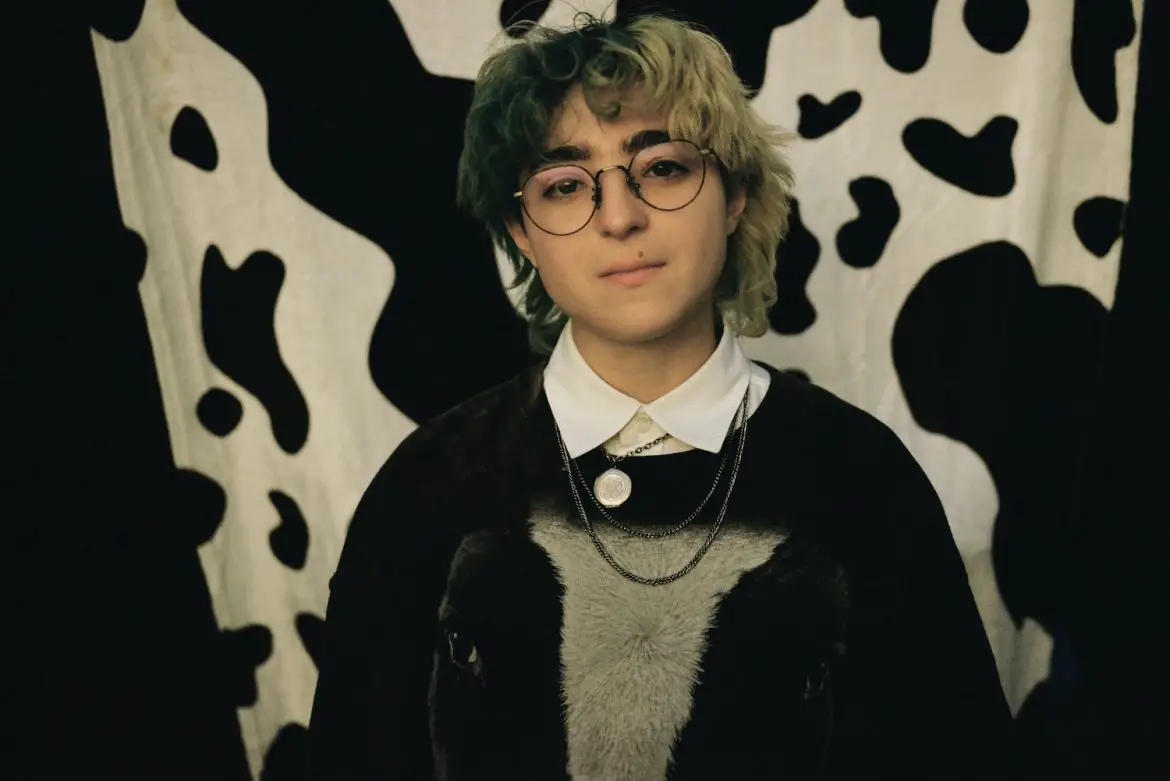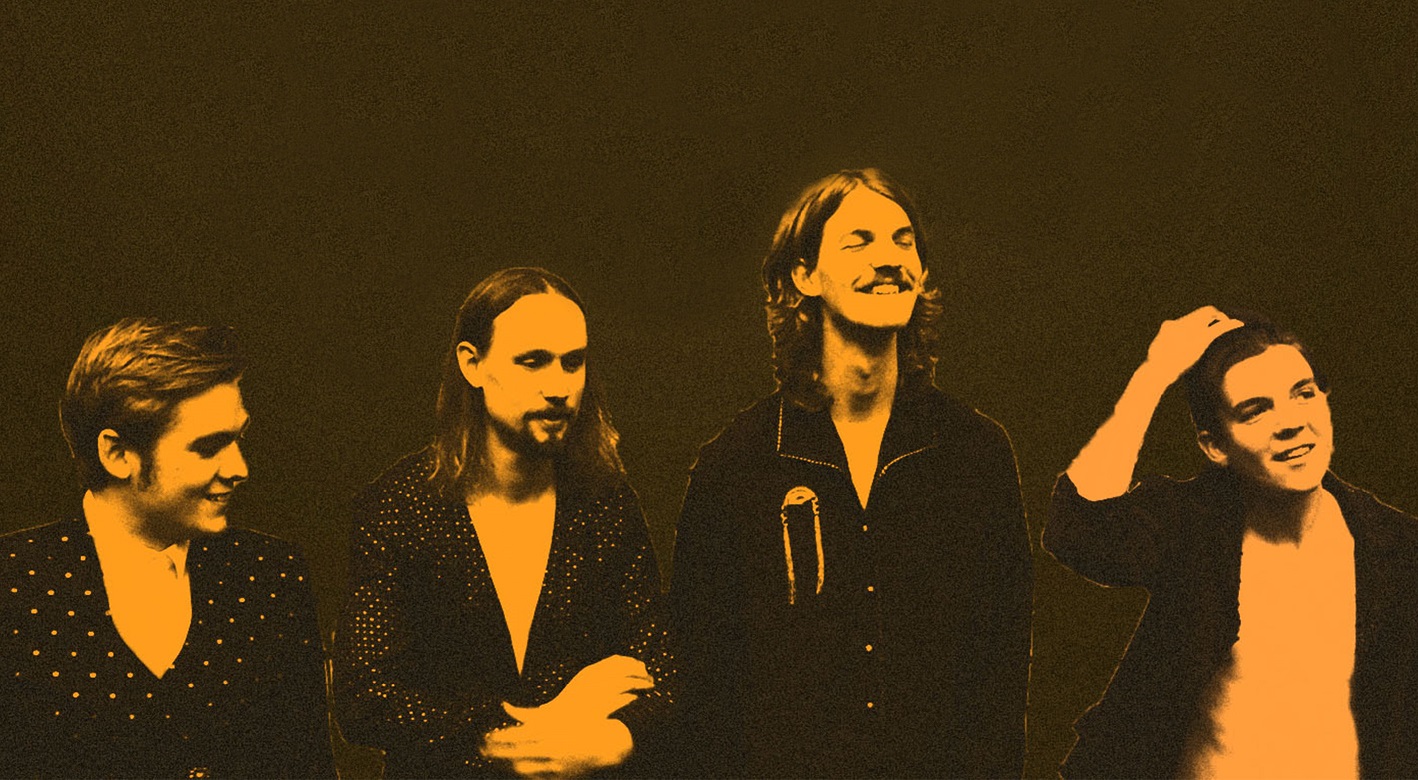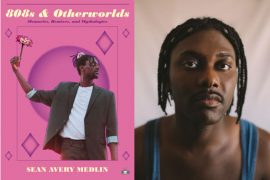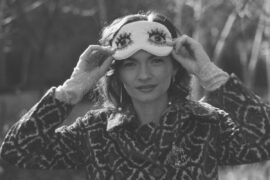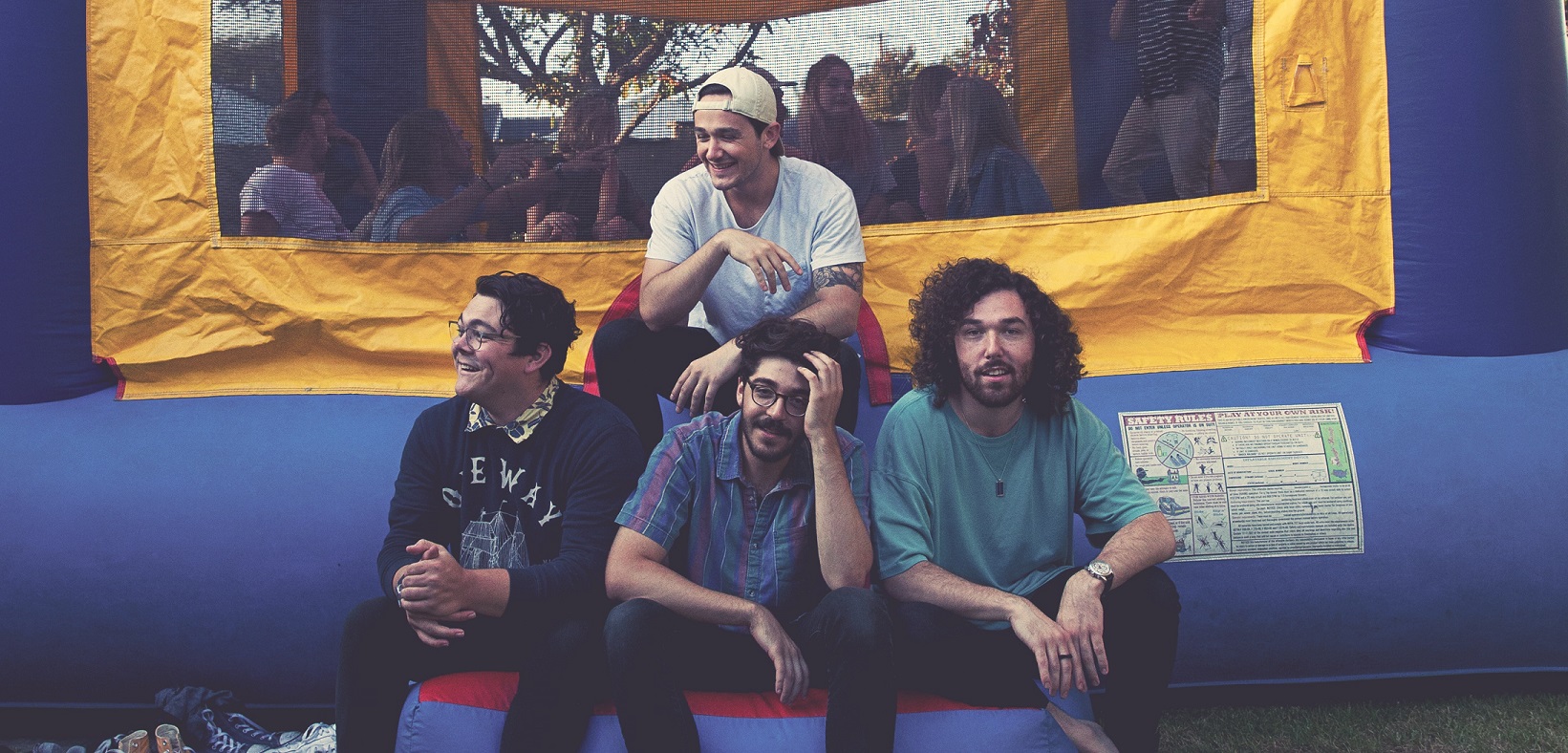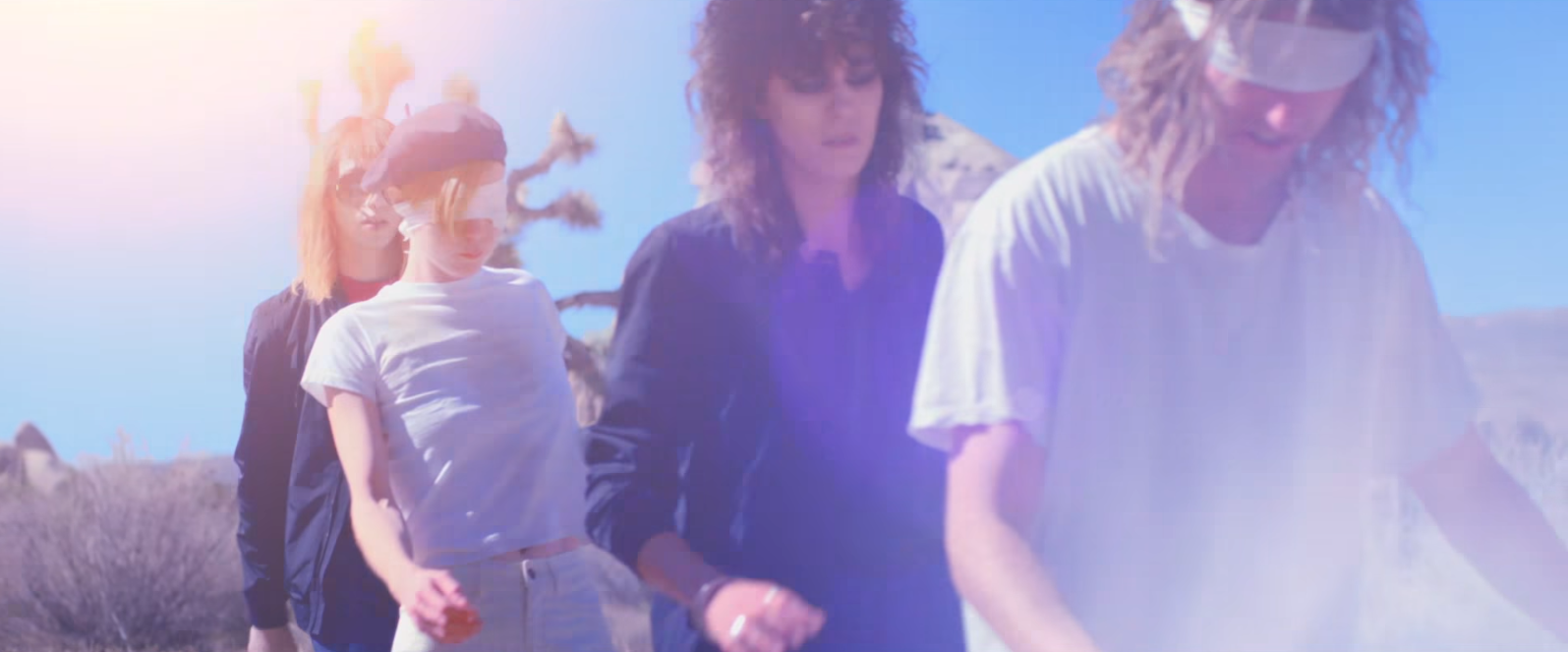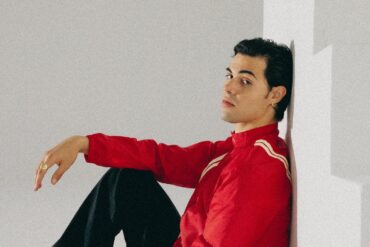Genre-blender Claud talks with Atwood Magazine about their debut album ‘Super Monster,’ their signing to Phoebe Bridgers’ Saddest Factory Records, and the road so far.
Stream: ‘Super Monster’ – Claud
‘Super Monster’ is a demonstration that growth is not linear, and that it’s okay to mess up. That even when you do mess up, you still deserve love and you still deserve to feel like you’re lovable.
For many of us, the past year has been something of a wash. For Claud Mintz, it’s been busy.
The 21-year-old Atwood artist-to-watch signed to Saddest Factory (Phoebe Bridgers’ record label), geared up for their debut album (Super Monster), and still found the time to sit down with Atwood Magazine and ruminate on what this whole “bedroom pop” thing is.
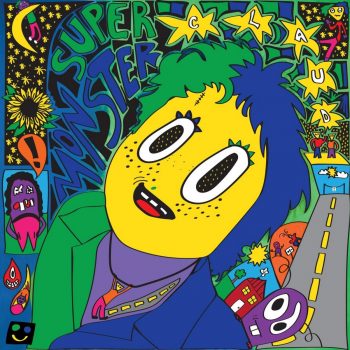
“I don’t know where that genre came from”, Claud tells Atwood. “Maybe I should know the history of it, because people call me that. But I don’t know… Labels have never really been my thing. I don’t really care about genres.” Indeed, Claud is often referred to as bedroom pop, indie pop, or some other hip new genre. But their music, as Super Monster demonstrates, doesn’t really fit into a particular genre. It isn’t supposed to.
With 12 tracks that span decades of musical influence and pay homage to some of the artists that Claud loves – artists like Lorde, Feist, The XX, and Smashing Pumpkins – Super Monster is a beautifully unique soundscape that is much more about its meaningful message than any perceived genre. “That was sort of the bigger thing for me,” says Claud. “I waited a while to call it a record because I wanted to make sure that my message was there. I didn’t just want it to be a collection of songs. That’s just an EP. I wanted it to have a theme and a message. I wanted people to know that I have something to say.”
Crafting a non-linear narrative of love and shortcomings, Claud draws roots from their own lived experiences to deliver a record that is cinematic, palpable, and sincere.
Aptly named after a Daniel Johnson sketch that found its way into Claud’s hands by sheer serendipity, Super Monster is a coming-of-age debut from an up-and-coming artist who is best described in the abstract. They are green. They are blue. They are yellow. They are Claud.
Super Monster is out now via Saddest Factory Records.
— —
:: stream/purchase Super Monster here ::
A CONVERSATION WITH CLAUD
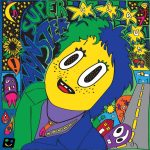
ATWOOD MAGAZINE: YOU RELEASED YOUR DEBUT SINGLE JUST TWO AND A HALF YEARS AGO. IT’S SAFE TO SAY THAT IT’S BEEN A WHIRLWIND ADVENTURE FOR YOU.
Claud: Wait that’s so weird I was like, “Really? Two and a half years ago?”
IT WAS ABOUT MID 2018, RIGHT?
Claud: Yeah, exactly.
WHEN YOU FIRST STARTED PUTTING OUT YOUR MUSIC, DID YOU HAVE GOALS IN MIND OF WHAT YOU WERE GETTING YOURSELF INTO? ARE THERE ANY THINGS YOU WOULD TELL YOURSELF BACK THEN, HAVING LIVED AND EXPERIENCED WHAT YOU’VE EXPERIENCED NOW?
Claud: Yeah. Everybody’s journey is different. I think when I started releasing music I had an idea of being what a musician was and what marks you had to hit to be considered a musician. I would be so hard on myself when I didn’t have anything to do for weeks on end. It was really just feeling lost, I guess. I had a lot of regret for leaving school and leaving behind a lot of my friends – and just recently I’ve come to realize that I’m so happy with my musical growth in the last few years. I wish I could tell myself two years ago, “Stop dwelling on this decision. You made the decision and you’re not gonna regret it, so just go.”
IT SOUNDS LIKE YOU’VE GROWN A LOT OF CONFIDENCE.
Claud: Definitely yeah. I was super insecure.
AND YOU WERE INDEPENDENT WHEN YOU STARTED. BUT YOU RECENTLY SIGNED WITH SADDEST FACTORY - WHICH IS PHOEBE BRIDGERS’ RECORD LABEL. DO YOU FEEL LIKE PHOEBE’S STRENGTHS AS A MUSICIAN AND AS A ROLE MODEL IN THE INDUSTRY FACTORED INTO YOU CHOOSING TO SIGN WITH HER LABEL?
Claud: Yeah definitely. I think there’s a few reasons why I did. But it definitely had so much to do with Phoebe. She works at this label so she has this perspective on the music industry that most people who work at labels don’t have. And I thought that was really special and unique. And on top of it, Phoebe and I talked for months and months and months on how she wanted her label to look, and what my vision was, and what her vision was. Eventually we just aligned, and I had this album coming together and I felt ready to have a team of people push it who believed in me as much as I believed in me. Being independent is awesome but it does feel nice sometimes to have this whole team of people who are like, “Yes! We’re on board”.
ABSOLUTELY. AND YOU WERE THE FIRST ARTIST TO BE SIGNED TO THE LABEL. YOUR ALBUM IS THE FIRST PIECE OF MUSIC THAT’S GOING TO BE COMING OUT OF IT. HOW DO YOU FEEL ABOUT WHERE YOU’RE AT, IN TERMS OF TRAILBLAZING THE RECORD LABEL?
Claud: I’m really excited. I feel super honored. I’ve definitely been admiring Phoebe’s music and work for years. So even when I first started considering it, I was never scared about it. I always really believed in Phoebe and her vision. She’s really doing really well right now. People are catching up on it. I’m just excited. I followed my gut.
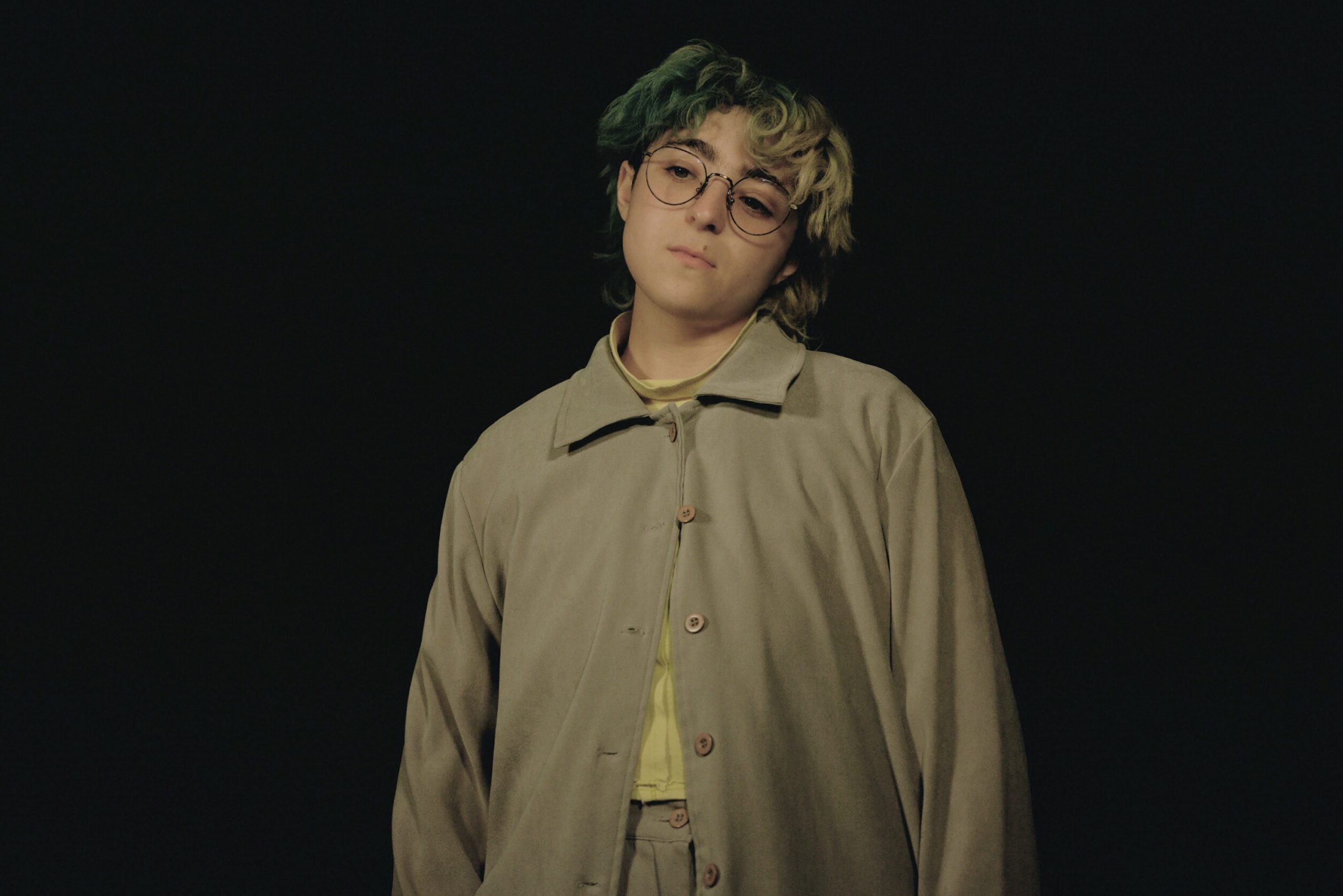
IN TERMS OF THE ALBUM – SUPER MONSTER – A LOT OF THE SONGS ARE ABOUT LOVE AND RELATIONSHIPS, BUT MAYBE NOT THE PARTS OF RELATIONSHIPS THAT ARE USUALLY COVERED IN SONGS. HOW DID YOU DECIDE WHAT TOPICS YOU WERE GOING TO HAVE ON THE ALBUM?
Claud: Picking the songs for my record was really difficult. I had a really large playlist of demos – probably 50 or 60 songs. A lot of the songs were about the same person or took on a similar perspective as another one. So when I narrowed it down to the 13 songs that are on the record, I thought “Okay, what has the most interesting perspective, and what has a cool takeaway? What is sincere to how I actually felt with this person or in this place?”
RIGHT, SINCERE. ARE ALL OF THE SONGS ON THE ALBUM ROOTED IN YOUR OWN LIVED EXPERIENCES?
Claud: Yeah all of them are, except for Ana. Ana is character writing.
AND ''ANA'' IS THIS STORY ABOUT CHOOSING TO NOT GO BACK TO THIS TOWN, AND THIS PERSON: ANA. CHOOSING TO TAKE THIS LEAP. WHY WRITE THAT SONG?
Claud: I co-wrote that song with Jake Portrait, who is awesome. He’s a really awesome producer and he plays bass in Unknown Mortal Orchestra. We were kind of just playing around on the guitar and I had this whole scenario in my head. I don’t know where it came from, like I really don’t know, but I was like, “Imagine this really noble and kind man who decides that he should leave his wife to go find himself and do self-exploration because he doesn’t feel like he’s being the best version of himself to his wife, and that’s not fair to her. How would you break that news to somebody?” So the song is basically dialogue from the phone call of the guy telling Ana, “It’s been a pleasure but if I don’t do this then I don’t deserve to be your man”.
IT’S A FASCINATING PREMISE. IT FEELS LIKE SOMETHING OUT OF A MOVIE.
Claud: It would be a cool movie.
IT WOULD BE A COOL MOVIE. AND THAT’S PRETTY MUCH THE ONE SONG OF THIS BATCH THAT DIDN’T REALLY COME FROM A LIVED EXPERIENCE?
Claud: Pretty much. I mean there are certain moments in songs that I pulled out of nowhere or maybe saw in a movie or a show, but most of it is pretty much from my experience.
IT SOUNDS LIKE WHEN WE HEAR A CLAUD SONG, WE REALLY HEAR YOU SINGING FROM YOUR HEART.
Claud: (laughing) I don’t know. Yeah, that’s what I hope to do.
WHAT DID IT MEAN FOR YOU TO WRITE THESE SONGS THAT WERE ABOUT YOUR RELATIONSHIPS WITH THESE PEOPLE AND THESE PLACES? DO YOU FEEL LIKE YOU LEARNED SOMETHING ABOUT YOURSELF BY WORKING ON THESE SONGS?
Claud: Definitely. Sometimes it’s almost like my subconscious is writing songs and after writing a song I’ll be like, “I don’t know where that came from. I don’t know what that was about.” And then a few months later I’ll be like, “Okay I know exactly what that was about.”
ABSOLUTELY. AND WHAT THOUGHT DID YOU GIVE TO THE WAY THE COHESIVENESS OF THE ALBUM, BEYOND THE VALUE OF THE SONGS INDEPENDENTLY. WHAT THOUGHT DID YOU GIVE TO THE WAY THE SONGS CREATE AN ALBUM AS A WHOLE?
Claud: Like what’s the overall message?
YEAH.
Claud: I feel like the album is a sort of demonstration that growth is not linear, and that it’s okay to mess up. That even when you do mess up, you still deserve love and you still deserve to feel like you’re lovable. So that was the overall theme of the record.
AND YOU START THE ALBUM WITH ''OVERNIGHT,'' WHICH LYRICALLY BEGINS: “I FELL IN LOVE LIKE A FOOL OVERNIGHT. I FELL IN LOVE BUT I CAN’T KEEP UP WITH YOUR LIFE.” SO THE STAGE IS SET FOR THE ALBUM, IN TERMS OF THAT THEME.
Claud: That was sort of the goal with making “Overnight” the first one on the record. Almost like, “Heads up, I fell in love. Oh god here it goes. Here’s the record.”
ABSOLUTELY. AND THEN FOR THE END OF THE ALBUM, YOU HAVE ''FALLING WITH THE RAIN.'' WAS THERE ANY REASON YOU ENDED WITH THAT SONG?
Claud: Yeah. That song is a positive outlook on a very dark time in my life. I wrote the song a few years ago and I always laugh when I think of that song because I had every right to write a sad song, but I just didn’t let myself do it. Instead, I was too optimistic to let myself dwell on my emotions for a minute. So that song was me saying, “You know I’m feeling down and feeling like this right now but it’s gonna be okay and I’m gonna get back up again and bounce back”. So I felt like that would be a nice closer message.
IT’S DEFINITELY A RESILIENT NOTE TO END ON. AND IN A WAY, IT’S FOCUSED MORE ON YOUR RELATIONSHIP WITH YOURSELF AND YOUR MENTAL HEALTH, WHEREAS A LOT OF THE OTHER SONGS ARE ABOUT YOUR RELATIONSHIP WITH OTHERS.
Claud: Yeah, exactly.
THERE’S ALSO A LOT OF DISTANCE IN YOUR SONGS. YOU’RE LEAVING A CITY, OR REVISITING A CITY, OR YOU CAN’T GO BACK SOMEWHERE. ALL THIS DISTANCE, WHY DOES THAT KEEP COMING UP?
Claud: I spent the last few years before the pandemic really moving around, and I really had a hard time grounding myself physically. I was always on tour. My family was really spread out, so even when I wasn’t on tour then I was trying to visit my family. And my friends were spread out so I was trying to visit my friends. I was just always on the move.
AND NOW WITH THE PANDEMIC, WE’RE ALL LESS ON THE MOVE. I FEEL LIKE IN SOME WAYS THERE’S ALMOST A BIT OF ESCAPISM, LISTENING TO IT RIGHT NOW. WE CAN’T GO ANYWHERE, BUT YOU TAKE US TO A LOT OF PLACES IN THE ALBUM.
Claud: Sad.
HOW HAS THIS TIME BEING IN ONE PLACE CHANGED YOUR WRITING?
Claud: I don’t know yet. I’ve done some writing in the past few months, but not too much. Some songs on the record were made in March or April 2020 but most of it wasn’t. I’m still trying to process and reflect on how this is affecting my life in the grand scheme of things. But the album is not about right now.
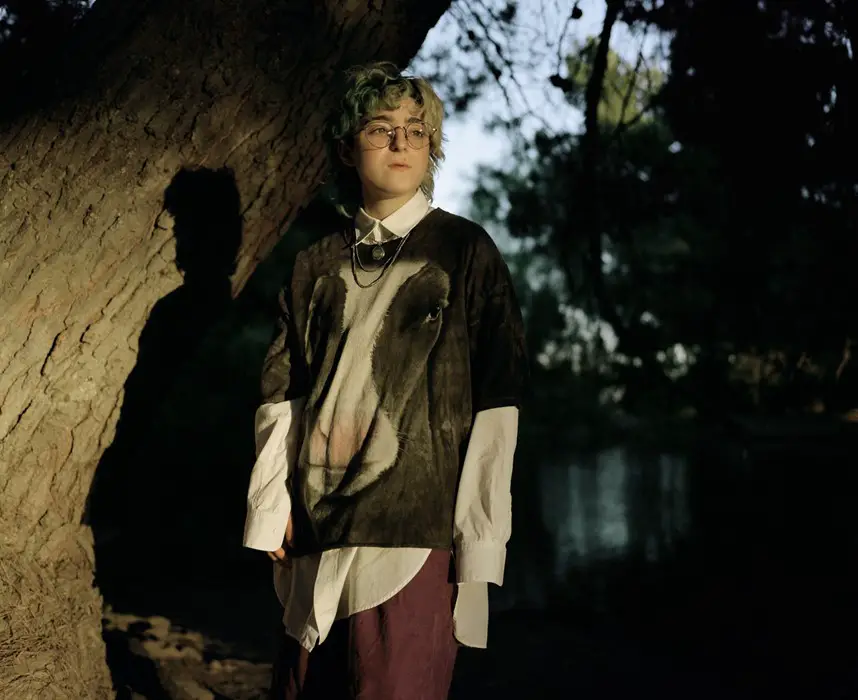
WHICH SONGS ON THE ALBUM WERE THOSE RECENT ONES, AND WHICH WERE OLDER?
Claud: The oldest song is about two years old, and the youngest song is probably from May or June. “Rocks At Your Window” is probably the last song I wrote for the album.
BETWEEN THAT TIME, DO YOU FEEL LIKE YOUR LIFE AND YOUR WRITING PROCESS HAS CHANGED? DO YOU LOOK BACK AND THINK, ‘WOW. THINGS ARE DIFFERENT’?
Claud: All the time. Everything is constantly changing for me. But I think I crave that change, it keeps me inspired.
AND DID YOU COLLABORATE WITH OTHERS TO WRITE THE ALBUM? WHAT WAS THAT EXPERIENCE LIKE?
Claud: It’s always been a mix for me. I think when I started making music I had a really hard time collaborating with people. I couldn’t be in the same room as somebody and write a song. But now I love working with other people and collaborating with other people, especially when I feel like I’ve written every possible song I could have by myself – which isn’t true but sometimes I feel like that. I definitely like to start by myself and see how far I can get and see what my brain comes up with on my own. And then I bring it to somebody else when I get stuck or want it elevated or want a new spin on it.
ARE THERE ANY GOOD EXAMPLES OF THAT IN SUPER MONSTER? ANY STORIES THAT FOUND YOU TAKING A SONG TO THE NEXT LEVEL?
Claud: Yeah. I think “Pepsi.” My friend Josh sent me this little key part and it was just the keys and I spent days writing over it. I sped it up and I slowed it down, and it’s definitely not the BPM it started at, because he just sent me four chords. And I liked the sound of the chords but I didn’t like the order of the chords, and I rearranged everything. And finally Pepsi was just those keys and my vocals. And I added guitar, but I thought “This is not an acoustic song. This should not just be keys vocals and guitar.” So I sent it back – all over text – and we flushed it out with drums. I added the bubble sounds and he added the can opening, and we spent days just flushing out the production. But I had to get as far as I could with it before sending it back to him.
I LIKE THAT YOU BROUGHT UP THE BUBBLE SOUNDS, BECAUSE ONE THING THAT I THINK IS REALLY INTERESTING WITH YOUR MUSIC IS THAT IT DOESN’T REALLY FIT IN ANY ONE GENRE. AND MUSICALLY, THIS ALBUM IS A STATEMENT, WHETHER OR NOT YOU WANT IT TO BE. DID YOU HAVE A CERTAIN VISION GOING INTO SUPER MONSTER, AND DID THAT CHANGE OVER THE COURSE OF ITS CREATION?
Claud: Yeah definitely. I always wanted it to capture the sort of naïve and lighthearted look I had on music before I started a career, because my approach to music was so much more open and so much more experimental. So I really wanted to capture that but at the same time I wanted to pay homage to the folk music I loved growing up and the Smashing Pumpkins because I loved them growing up. A big part of it for me was that I was making sure that I was saying what I wanted to say lyrically and making sure that I wasn’t being redundant. And not embarrassing myself or embarrassing other people, unless I wanted to. That was sort of the bigger thing for me too. I waited a while to call it a record because I wanted to make sure that my message was there. I didn’t just want it to be a collection of songs. That’s just an EP. I wanted it to have a theme and a message. I wanted people to know that I have something to say.
I waited a while to call [Super Monster] a record because I wanted to make sure that my message was there… I wanted it to have a theme and a message. I wanted people to know that I have something to say.
BEYOND THE MESSAGE, ONE OF THE FIRST THINGS PEOPLE WILL ASSOCIATE WITH YOUR NAME ARE THE WORDS “SUPER MONSTER”. WHAT DOES THAT TITLE MEAN FOR YOU?
Claud: That title actually came from a Daniel Johnston sketch. One of my best friends showed me Daniel’s music and art three or four years ago. Ever since, I’ve been super enamored by his music but also his art. He draws a lot of monsters and creatures and frankensteins and stuff like that. And I always really resonated with his take on outsiderdom, outsiderness. So I mixed my album at Electric Lady. And we were only there for two or three days because it was expensive, but on the last day we were there the owner of the studio was like “Hey I heard you like Daniel Johnson. I’m actually managing his artwork with his brother, since he passed away, and I found this sketch. And it was just a scan on his phone of this sketch that said “Claud the super monster” on it. And it was really wild and I was like “who in his life was named Claud? Where did that come from?” And they were like, “we have no idea. It’s just a character he made up.” And I was really moved by that and I asked the family if I could use the title “Super Monster” and they said yes.
I WONDER IF PEOPLE CAN SEE THAT SKETCH. IS IT PUBLICLY AVAILABLE?
Claud: I think I’m one of the only people who has seen it. I’d have to ask if I could share it, I’m not sure.
THAT’S A REALLY COOL STORY EITHER WAY. IS YOUR ALBUM ARTWORK INSPIRED BY THAT?
Claud: I think my visual style is very different from Daniel’s, but Daniel did all of his own artwork so I was like “might as well take a stab at it myself and see what I can do.” And so that’s why I originally attempted to draw my own artwork. Sort of like an accident almost.
YOU’VE BEEN DESCRIBED AS BEDROOM POP BY A LOT OF MEDIA. OR INDIE POP. HOW WOULD YOU DESCRIBE YOUR MUSIC TO YOUR PARENTS OR GRANDPARENTS?
Claud: They have no idea what bedroom pop is. They’re like… huh? I don’t make music in my room. It’s too small! I don’t know why anybody ever started calling me that. I don’t know where that genre came from. Maybe I should know the history of it, because people call me that. But I don’t know. I think it’s a reference to my generation, because we’re this generation with a studio on our laptop. You can literally make music wherever you want, whenever you want, by using GarageBand. It just comes with your laptop. So I feel like maybe that’s where bedroom pop came from, but I don’t make music in my bedroom.
HOW WOULD YOU DESCRIBE YOUR SOUND?
Claud: I blend genres a lot. You know, I don’t really care. Labels have never really been my thing. Some people call it indie pop, and I’m cool with that. Some people call it alternative, I’m cool with that. I don’t really care about genres.
I LIKE THAT. I LIKE THAT A LOT. I ALSO REALLY APPRECIATE YOU BEING VOCAL AND HAPPY TO SAY “WHAT DOES BEDROOM POP MEAN? THAT DOESN’T MAKE SENSE.” BECAUSE IT’S LIKE THE HIP THING TO BE, AND I NEVER UNDERSTOOD IT. I GUESS IT’S A VIBE?
Claud: I guess. I don’t really know. I don’t care. I do think some musicians own it and are like “Yes! I am bedroom pop!” But I don’t.
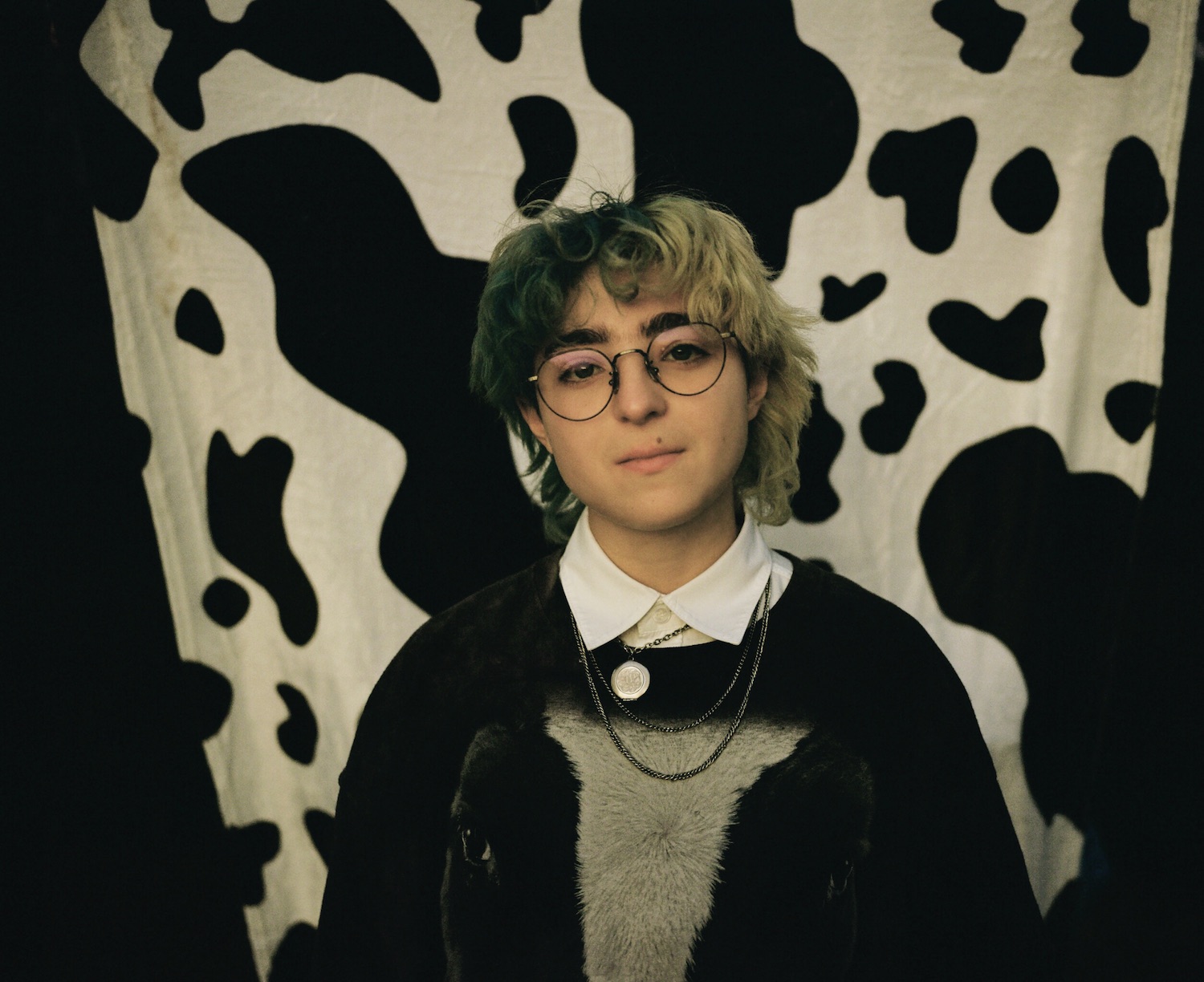
WE TALKED A BIT EARLIER ABOUT INFLUENCES, LIKE PHOEBE AND PUMPKINS. IN THE PROCESS OF MAKING THIS RECORD, DID YOU EVER THINK BACK ON THE ALBUMS THAT INSPIRED YOU IN THE PAST?
Claud: I can’t pinpoint one record. There were definitely artists that did a lot for me. Like I really love Lorde, and I really loved Feist and The XX. I can’t really pinpoint one or two records.
AND WHO ARE YOU LISTENING TO RIGHT NOW?
Claud: Oh my gosh. Let me pull up my playlist. Well I listen to a lot of Adrianne Lenker. I really like this artist Dua Saleh. I’m sort of rediscovering Brittany Howard. Rina Sawayama. Yeah. That’s sort of where I’m out right now.
AS A LYRICIST, DO YOU HAVE ANY FAVORITE MOMENTS OR HIGHLIGHTS OFF OF THE SONGS ON THIS ALBUM?
Claud: I think overall I’m pretty proud of the lyrics of Ana, and Pepsi has some fun moments in there.
IF YOU HAD TO USE JUST THREE WORDS TO DESCRIBE THIS ALBUM, WHAT THREE WORDS WOULD YOU USE?
Claud: Green. Blue. Yellow.
I KNOW THAT ONCE THE ALBUM DROPS, IT’S ONLY THE BEGINNING. AS WE GET CLOSER TO THE RELEASE, ARE YOU DISCOVERING ANYTHING NEW ABOUT THIS ALBUM THAT YOU HADN’T NOTICED BEFORE?
Claud: Every few weeks I revisit the record. I listened to it so much when we were mixing it that I took a break for a few weeks, or months. Just recently I’ve been able to revisit a bit more. It’s really interesting hearing other people’s takes on it. It makes me think about it from a different perspective. But I think I still have the same general feelings towards it.
GREEN. BLUE. YELLOW.
Claud: Green. Blue. Yellow.
— —
— — — —

Connect to Claud on
Facebook, Twitter, Instagram
Discover new music on Atwood Magazine
? © Angela Ricciardi`
:: Stream Claud ::

